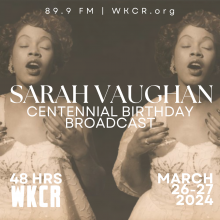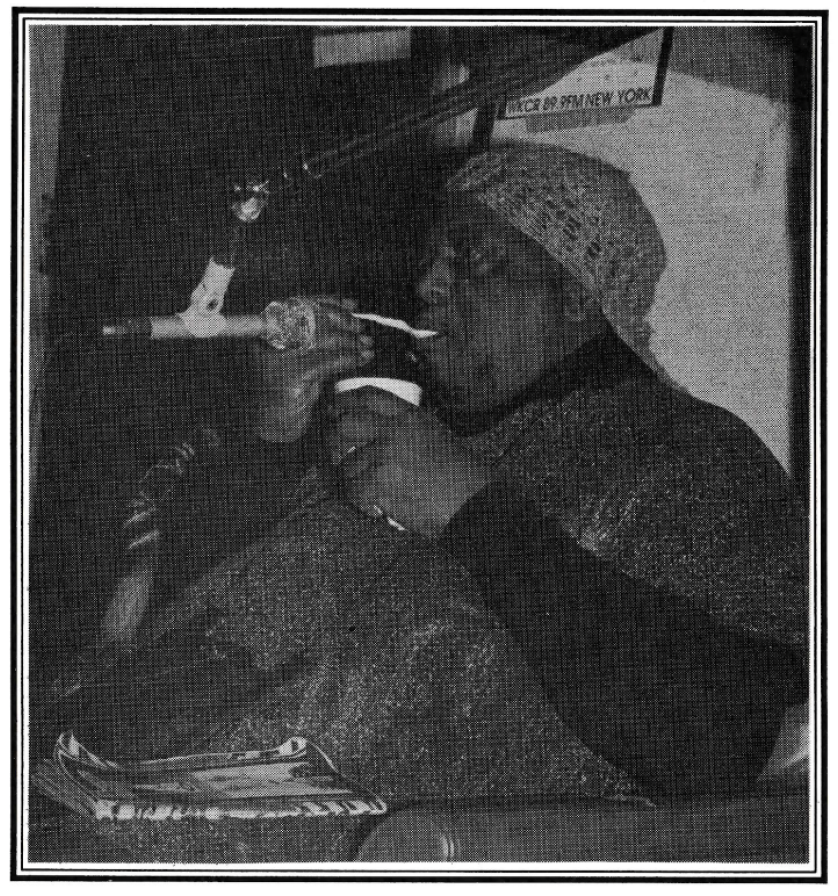
WKCR is very pleased to announce a 48-hour broadcast in honor of the 100th anniversary of the birth of legendary jazz vocalist Sarah Vaughan.
Nicknamed “Sassy” and “the Divine One,” Vaughan had a range that went from baritone to soprano. With her inventive, lyrical style, she helped popularize the art of jazz singing, along with Ella Fitzgerald and Billie Holiday.
Born in Newark, New Jersey on March 27, 1924, Sarah Lois Vaughan was a musician from the start. As a child, she played piano and sang for her local church––and even snuck into local venues at night to perform.
In 1942, Vaughan won the Amateur Night contest at Harlem’s iconic Apollo Theater with a powerful rendition of “Body and Soul.” For that performance, she won only $10––but was also awarded a week’s engagement at the Apollo, opening for Ella Fitzgerald. At one of these performances, she met pianist Earl Hines, her first major collaborator.
In 1943 and ‘44, she toured with the Earl Hines Big Band. The band was full of young musicians soon to become jazz giants––among them Dizzy Gillespie, Charlie Parker, Miles Davis, and Dexter Gordon. Vaughan recorded for the first time with the Earl Hines Big Band in December 1944, though she soon left to pursue a solo career.
In the late ‘40s, she performed at clubs including Café Society (where she met her future manager and husband, George Treadwell) and recorded tunes, mostly for Musicraft. She was especially proud to be one of the first vocalists to record “Tenderly,” on July 2, 1947.
With Musicraft on the verge of bankruptcy, Vaughan signed with Columbia, where she sang mostly pop ballads. A friend to NYC radio, Vaughan hosted her own show on WMGM in 1949. On Songs by Sarah Vaughan, she performed with George Shearing (piano), Oscar Pettiford (bass), and Kenny Clarke (drums).
From 1953 to ‘59, she recorded for Mercury and its subsidiary EmArcy. Notable tracks from this period include “Whatever Lola Wants” and “Misty.” “Broken-Hearted Melody” became her first gold record, though she initially disliked the tune. She was particularly fond of her 1954 record with Clifford Brown––and her instinct stood the test of time, as the record was inducted into the Grammy Hall of Fame in 1999. She toured extensively during this period, both at home and abroad: she appeared at the Newport and New York Jazz festivals, performed at Carnegie Hall, and embarked on a European tour.
After a brief stint recording for Roulette, Vaughan returned to Mercury, for which she recorded Sassy Swings the Tivoli with producer Quincy Jones live in Copenhagen in 1963. In the ‘70s, Vaughan recorded mostly popular tunes, especially compositions by The Beatles. Following an unpleasant experience recording for Mainstream Records, she signed to Norman Granz’s label, Pablo, to release the I Love Brazil! (1977). She released two more notable albums with Granz: How Long Has This Been Going On? (1978), backed by Oscar Peterson (piano), Joe Pass (guitar), Ray Brown (bass), and Louis Bellson (drums); and Gershwin Live! (1982), a live album of Gershwin tunes backed by the Los Angeles Philharmonic. The latter won a Grammy for Best Female Vocal Performance in 1983.
1989 saw the release of Quincy Jones’s Back on the Block, in which Vaughan and Ella Fitzgerald scat together. This would be Vaughan’s last recording. That same year, she was diagnosed with lung cancer and unable to finish a set of performances at NYC’s Blue Note. She passed away in her home at the age of 66 on April 3, 1990.
But here at WKCR, Vaughan’s legacy lives on. Each year, we celebrate her birthday with an all-day broadcast; this year, we celebrate her centennial with a two-day broadcast.
Listeners can tune in on 89.9FM or stream the centennial celebration live on our website, wkcr.org. Follow WKCR on Instagram (@wkcr) and Twitter (@WKCRFM) for updates about this special broadcast and future events. Online listening is available 24/7 at wkcr.org via our web stream.
